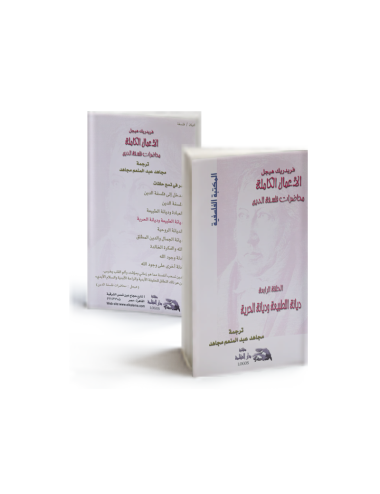History of Aesthetics
Man creates masterpieces of literature and art, but he does not want to be satisfied with this, but rather he wants to understand what is behind his creativity.
0.142 kg - 200 kg
Man creates masterpieces of literature and art, but he does not want to be satisfied with this, but rather he wants to understand what is behind his creativity.
The higher is also the deepest, and in it the separate moments are grouped together in the subsequent pigmentation of the subjective unity, the need for the interconnectedness that characterizes directness is eliminated, and the separate moments are returned to the subjective unity.
For Hegel, thought is not philosophical if it is not also religious. Both religion and philosophy have a common object and share the same content, for both are concerned with the inherent unity of all things. Hegel's doctrine of God provides the means for understanding this fundamental relationship. Although Hegel stated that God is absolute Spirit and Christianity is the absolute religion, the compatibility of Hegel's doctrine of God with Christian theology has been a matter of continuing and closely argued debate. Williamson's book provides a significant contribution to this ongoing discussion through a systematic study of Hegel's concept of God.
The normal, eternal, absolute idea - in its eternal existence - in and of itself - is God in his eternity or eternity before the creation of the world, and outside the world.
The main characteristic here is subjectivity as a self-determining force - and this subjectivity and rational power that we have met before in the form of the one who has not yet been defined within himself and whose goal - as it appears in the realm of reality - is in this the most specific thing possible.
The separation of religion from the subject manifests itself in the emergence of an actual will. In the will I am an actual and free being, and I present myself against the subject as another, in order to represent it with myself by removing it from that state of separation.
Suren Kerkegor in Copenhagen on May 5, 1813, both of his father and mother descended from the Jute family, a Germanic tribe that invaded the European continent in the fifth century.
This comprehensive exploration of the interpretive process,
has served as a successful textbook. It focuses on the three "worlds" of biblical interpretation--the world of the author, the world of the text, and the world of the reader--to help students develop an integrated hermeneutical strategy. The book offers clear explanations of interpretive approaches, which are supported by helpful biblical examples, and succinct synopses of various interpretive methods. Pedagogical aids include end-of-chapter review and study sections with key terms, study questions, and suggestions for further reading.
The world houses people equally with natural things. When the world is thus treated as a gathering or even a gathering of natural things, it is not conceived as nature, and we do not understand that it is something that is in itself a holistic system, a system of regulations and arrangements, especially laws.
This is the first of two volumes of the only English edition of Hegel's Aesthetics, the work in which he gives full expression to his seminal











